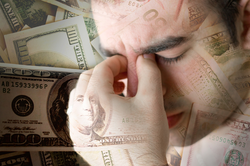 CAN HAPPINESS BE PURCHASED? Today we live in a world in which practically anything has a price tag and can be purchased. The question that I am posing in this blog is whether happiness also has a price tag and/or whether it can be purchased for the “right” price. Most of us have heard statements such as: I will be the happiest person if only I had that new car, jewelry, clothes, house, etc; or I will be happy if I am in a relationship. Our postmodern world and instant gratification culture certainly provides opportunities to buy objects of our desires, and certainly online dating can provide the latter as we potentially can pick the person of our choosing tailor-made and nicely packaged (size, shape, color, etc) for us. Are we happy though? Invariably the answer is “Yes”, at least for a short time until the excitement subsides. Today we live in a narcissistic world that is reproduced by ever increasing consumption. We consume objects, ideas, relationships, etc, each promising ever lasting excitement and happiness except that the excitement and ensuing happiness disappears very quickly and one has to look for other objects to consume, helping the cycle of capital to continue. The larger question is what is happiness? We generally say: I am happy. Happiness is a feeling not different from other feelings. Feelings are perceptions of emotions (by somatosensory cortex) which are bodily states. Most of us have noticed that when our body is tense and contracted we are not happy. Alternatively, when our body is relaxed and graceful we are happy. Usually we feel some level of happiness for as long as our body is relaxed and not tense. Happiness is also related to pleasure. When we feel pleasure we usually say that we are happy. And conversely when we are happy we sense pleasure in our body. Life is based on pleasure principle, otherwise it would have ceased to exist long ago. We homo sapiens are not an exception to the rule. Our life is based on the pleasure principle. However, due to our many traumas our bodies tense up and contract and we no longer feel the streaming of pleasure in our body. It then takes much work to restore the ability to feel pleasure to our body. Pleasure may cause us to feel anxious (pleasure anxiety). Just remember when we were little, when we had fun, and played and were joyful, we were told to be quiet and/or be still, etc, or were punished for it. We then tensed up our body to conform to the wishes of grown ups (our significant caretakers), reducing our abilities to feel pleasure. Alternatively, from an energetic point of view, one can also say that when the waves of excitement stemming from the inside of our body hit the tense and contracted musculature, the result is anxiety. Most of us may have experienced that after being happy and joyful for a while, all of a sudden we get a sense that something bad may happen which quickly ends our joy and happiness. In the absence of living a pleasurable life, we tend to seek excitement, the sensation of which creates short lasting streams of pleasure and happiness. But as the excitement fades away, so does the pleasure and happiness. And unfortunately this is the state of our society, that is seeking and registering intensities of stimuli as excitement which subside quickly, only to be replaced by others. We then become perfect consumers of goods who help reproduce our socioeconomic system. In this process our true self is denied, and instead we identify with images, ideas, etc, leading to a narcissistic existence. Happiness is the perception of pleasurable state of the body. Happiness can last long if our body is graceful and soft, when we are content and lovingly accept life. This however, does not mean that pain (due to illness or other unforeseen events) will not exist, but it means that in most cases pain will be short lived, and once the state of grace is restored to the body, pleasure and happiness return. Our body will be soft and graceful when we are self aware and express our feelings appropriately. Repression of feelings results in a contracted and tense body and is more associated with displeasure. In a graceful body state, breathing is pleasurable, and when our body is graceful, movement is pleasurable. When our body is soft and graceful, we can feel the pleasure of loving and being loved. In conclusion, I must state that happiness bought is nothing but narcissistic compensation for a life devoid of pleasure and body devoid of grace. "We deaden our bodies to avoid our aliveness and then we pretend to be alive to avoid our deadness" - Alexander Lowen, MD Comments are closed.
|
AuthorHomayoun Shahri Archives
May 2016
Categories
All
|
Ravonkavi Privacy Policy
©2018 Ravonkavi
©2018 Ravonkavi

 RSS Feed
RSS Feed